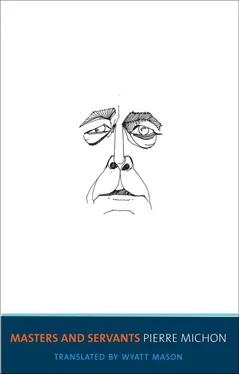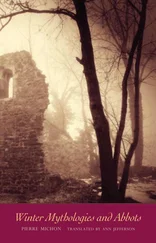The painters. But not all of them, that is to say not all of them together at the same time, in the same place, because there were certain affinities, camps with daggers drawn against others or devouring each other like wasps in a jar; old Cavalier d’Arpin and Pietro Testa, Sacchi and Pietro Berrettini de Cortone, Valentin de Boulogne, Gérard de la Nuit, Poussin, Mochi, Swanevelt and the two Claudes, Claude Mellan, and Claude Lorrain; occasionally, you even saw that drunken clown with them, Pieter van Laer, known as il Bamboccio , gimpy and misbegotten, with coarser boots but without the boorish airs, since he wasn’t really one of them; but never il Cavaliere Bernini, who was the biggest fish in this ocean and had far better things to do with his time. It was a Congregation of Virtuosi, les Académiciens de Saint Luc , dowered by Barberini far more than by Saint Luc, so they were Barberini’s band; these Barberinis whom one never saw there because they were forever psalming at Saint Peter’s; both Barberinis, Maffeo with his tiara and the little braids, and Taddeo who had the more substantial braids, the purse strings; these two and a hundred others, all of the interminable king’s men, Francesco and the two Antonios, all the little Italian names, all of whom wore fiery moiré, braided hats, miters, robes, and lambskins, and all of whom had three bees in their coats of arms and who used such titles to buzz through Saint Peter’s, or through Castel Gandolfo or the Latran, in the leafy villas of Tivoli, in Frascati, even buzzing up to the smallest hill where there was surely just enough water for it to come crashing back down into basins, watching water collapse with blank stares, making honey in the mellifluous coffers of the palace, the gardens, the churches— all these men with bees in their tabards hired the painters. For in order to build and decorate such coffers, churches, or palaces, in order to make the wax into which Maffeo and Taddeo, the two Antonios, the whole swarm, could consume their meats, their women, all the books written in all the languages since Saint Peter, and, in return could spew out gold, writs that kill, that pardon, that absolve those they kill, could spew out the balloons bursting across Europe, the Latin that beckons angels, and the church songs that swing wide the doors to mortal souls — it takes a lot of painters to cover these Godly hives in honey, painters who then labored in this honey, struggling to see the world or pretending to, while from this commerce also gleaning a little honey for themselves, in passing. And to manage this, these painters weren’t willing just to consume things, to devour books, meats, women; they actually had to apply themselves, had to crouch down and do some gilding, had to demean themselves, to work, to practice their craft. So that’s the reason for their little bazaar in Tivoli, collecting their pollen in my pastures, mimicking the princes while peering at the horizon from on high, but returning home to paint like boors, up to their elbows in gold just as I had blood and gore up to mine when my ewes gave birth, when I delivered them. But who will deliver them?
I know all of this now, but that cowherd, the little swineherd, he didn’t know a thing. I didn’t know their names, I didn’t even know that Barberini was their patron saint. The swineherd watched men with big hats and beards do delicate little work, like women darning socks.
I grew used to their little routines, but I remained apart from them. Soon, if they hadn’t shown up for several days, I’d get impatient for their arrival — they often preferred the other side, the Cascatelles, beautiful, useless rocks where nothing grows. I waited for them, invoked them by various magics: I pretended to be one of them, I gestured expansively toward some point on the horizon and tried to concentrate on it at length, my head cocked to the side, very serious and very stupid, but nothing came of it. And when they would finally return, I’d be upset that they were there. I was a lost child, whom nothing and no one could amuse. I didn’t know where I would find amusement. And then they’d be there and I’d move my flock a little, all of us fiddling off on our own, not making a show of noticing each other, I with my whistles and three jay-feathers, some bits of wicker, and they with their papers and their leads; the blue of my jay feathers seemed sadder, smaller. But all of this was in the order of things, undoubtedly; one day, that order will fall.
VERY EARLY ONE MORNING, I went to cut whistles down below a thicket, along one of those humid banks from which trembling scents rise, stirred by the lightest breeze; a bank of willows and aspens beneath which the low species gather, grass snakes, frogs: the best whistles come from the bark of these trees, whistles from which one can draw long fat moans, like those of frogs. And yes, God knows I didn’t go there just to look for good whistles. The odor of rotting leaves mounted, and leaning into it I advanced cautiously, preoccupied, my eyes fixed on the ground. The June dawn found me through this low wood. By a detour through a breach in the trees, I saw far before me high on a hill the facade of a palace in the rising sun: nothing moved there, no one stirred, it was as bright and uninhabited as a rock; here, in the wood, the nighttime mists persisted, the foliage was unfolding, all was black. I felt good. I began to sing a song of my own invention that I was secretly nourishing, that I often returned to and embellished to my liking in the gimpy language that then was my domain; it had something to do with my azure pisseuse; with certain other riches; and with a Visitation whose great generosity tosses such riches into the heart of a swineherd. I rejoiced at this prayer, and in my excitement I stripped many more branches than I needed: I sang at the top of my lungs; I pranced around; the palace up above was blazing as though it were my song; it was calling to me, I flew toward it, I held it in my hand, slept on it and clutched it; the three notes of the hoopoe were my response, golden and distant as a sleeping palace. Tears came to my eyes : my mother cried the same way, the poor woman, when, bowed, the Visitation, Our Lady in Procession, passed above her. The sky shimmered: day had broken, it sneaked in beneath the willows, and in this half-light a white mask was smiling. My tears froze on my cheeks. The hoopoe’s cry drew nearer. The mask was blackly mustached, with thick lips and strong teeth that gleamed in a smile; there was another white something in the shadows, some paper that the mask was holding. This sheet and this mask paused, breathing, making two large bright spots of the same size, the double ocelli of a very big, black butterfly, its invisible wings trembling in the willows; I was beneath this trembling. I don’t know if I was afraid, it seemed benevolent; it wasn’t a flying thing: just a very dark, stocky man whom I had already seen. The large, pale face and the jet black hair belonged to Claude Lorrain.
Something bolted beneath the leaves; I turned on my heels and ran. I hadn’t even left my hiding place when a hand grabbed me behind the collar and lifted me off the ground. I didn’t struggle, I had seen him enough to know that the big black butterfly was a giant. He put me down, turned me toward him without letting me go, and spoke to me sweetly the way you talk to a scared animal. I wasn’t listening: the sun now shone in the tall trees, their leaves trembling with this bright bounty as they do in the worst of storms, in the deadest calms, at midday as at dawn, everywhere at last awaking, the palace shutters rattling, opening under someone’s hands, and in my wooden head as in the rustling skies pealing bells resonated, rose, giving peace to nothing, the fury of the pounding bells making everything seem forgotten, disappeared, the final words of the prayer to the Visitation that, like my life, I had gotten from my mother, like my fear, like my shame: now and at the hour of our death . I repeated this from my depths like a bird singing the same three notes over and over. Perhaps I too said them aloud. All that time Claude held me, and I felt his breath on my face. I felt a little better, and I saw up close this sort of turnip he had for a face; I understood perhaps that in looking at me he remembered something long past, or was trying to. The color returned to my cheeks, he smiled. Still looking into my eyes he began to hum, and soon was singing at length, in its entirety, in a lovely voice, the exact words of my song, the carriage and the blue dress, the golden flow. No one but I had ever sung these words. He held in his laughter as he was singing, and when he came to the silly refrain in which I was praying to the queen of Heaven for a pisseuse of my own, he laughed with his mouth wide open. He held my collar tighter and said that the riches of my song would be mine, however little good they’d do me. With an open hand he made a broad gesture to the visible horizon, the sun, the trees, and the palace, as if he were also showing all that one couldn’t see in the palace, the doves, the Madonnas: “All of this,” he said, “is yours, if you enter into my service.” He had relaxed his grip, I was free; I fell where he dropped me, I cried every tear in my little body. Seated, he waited without looking at me. I think that the hoopoe let out its three notes once more, three little sacks of honey in the woods. I remained and followed him.
Читать дальше












